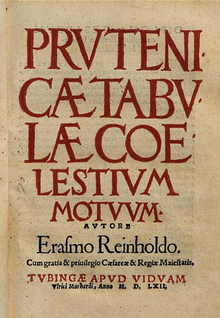User:Tashapacker/sandbox
Erasmus Reinhold
[edit]
Erasmus Reinhold was born in Saalfeld, Saxony in 1511. In 1536, Philipp Melanchthon appointed Reinhold to professor of higher mathematics, a subject which included astronomy, at the Martin Luther University of Halle-Wittenberg where Reinhold had previously studied.[1] Reinhold initially became acquainted with Copernican theory through the writings of Georg Joachim Rheticus, an astronomer and colleague who also worked closely with Melanchthon at the University. Before De Revolutionibus orbium coelestium was published, Reinhold gained information regarding Copernican theory, specifically regarding the movement of the moon, from Narration Prima. This book was written by Rheticus, and provided his analysis of copernican theory. Based on his knowledge of Copernicus’s lunar theory, gained from Rheticus's Narration Prima, Reinhold praised Copernican theory. This is seen in Reinhold’s annotations within Peurbach’s New Theorics of the Planets, published in 1542. In these notes, Reinhold mentions his dissatisfaction with the lack of understanding in modern astronomy, yet also mentions how Copernicus’s lunar theory restores his hope. In additional annotations, Reinhold continually mentions how new Copernican theory simplifies astronomical motion by erasing the need for an equant, an idea previously introduced by the geocentric model of the Ptolemaic system.[2][3] This new idea, the rejection of the equant, is the source of Reinhold’s praise of Copernicus and Copernican theory, as it simplifies planetary motion and in his opinion, allows for the future of astronomy to move forward in a smoother, less confusing or cluttered manner.
After the publication of De revolutionibus orbium coelestium, Reinhold remained relatively neutral on the issue of a heliocentric versus a geocentric cosmos. However, he wanted to recalculate and provide clean and simple to read tables based on the new ideas of motion presented in De revolutioninus. Reinhold did exactly this as he wrote and published the Prutenic Tables in 1551. Melanchthon thoroughly supported this new compilation of tables of motion, and even helped secure funding from Alrecht, the Duke of Prussia, for the publishing the Prutenic Tables.[3]
 | This is a user sandbox of Tashapacker. You can use it for testing or practicing edits. This is not the sandbox where you should draft your assigned article for a dashboard.wikiedu.org course. To find the right sandbox for your assignment, visit your Dashboard course page and follow the Sandbox Draft link for your assigned article in the My Articles section. |
- ^ "Erasmus Reinhold - The Mathematics Genealogy Project". www.genealogy.math.ndsu.nodak.edu. Retrieved 2019-11-13.
- ^ Evans, James (1984-12). "On the function and the probable origin of Ptolemy's equant". American Journal of Physics. 52 (12): 1080–1089. doi:10.1119/1.13764. ISSN 0002-9505.
{{cite journal}}: Check date values in:|date=(help) - ^ a b Westman, Robert S. (1975). "The Melanchthon Circle, Rheticus, and the Wittenberg Interpretation of the Copernican Theory". Isis. 66 (2): 165–193. ISSN 0021-1753.
